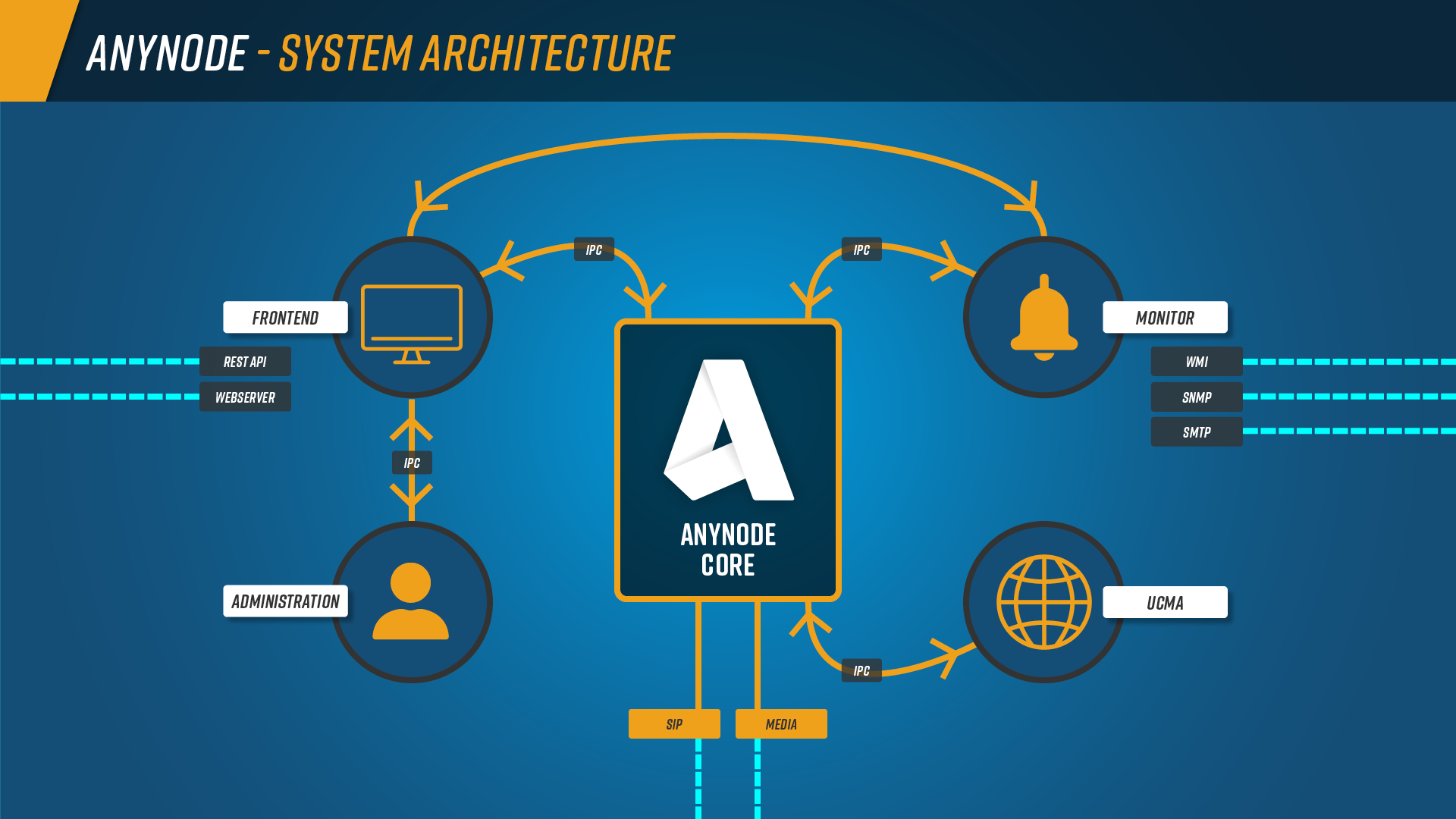Core Components
anynode consists of four primary processes to deliver a range of services, including SIP communication, media processing, routing, and security enforcement. These processes are anynode (the core service), anynode administration (the management interface), anynode frontend (the user interface for configuration and monitoring), and anynode monitor (for system health and performance monitoring). Additionally, for Microsoft Skype for Business integrations, an optional fifth process, anynode UCMA, is available.
This modular approach offers several key advantages: it ensures isolation of core functionalities which minimizes security risks, enables improved scalability by allowing each component to operate independently, and enhances security through strict access control between different processes.
A detailed description of anynode release numbering can be found in the Technote anynode Installation and Maintenance. The release numbers are important as they indicate the version and update status of anynode, ensuring users are informed about the latest features, improvements, and security patches. Each release number corresponds to detailed Release Notes, which provide comprehensive information on improvements, bug fixes, and new features, enabling users to understand the impact of updates on their systems and maintain optimal performance and security.
anynode core
The anynode core is the fundamental service that enables SIP communication, media processing, routing, and security enforcement. It operates as a high-performance, modular engine designed to handle real-time signaling and media transmission efficiently and securely. The anynode core is the backbone of the entire anynode system, ensuring reliable, scalable, and secure VoIP communications in enterprise and carrier-grade environments.
Key Responsibilities
-
SIP Signaling Processing: Manages all inbound and outbound SIP messages, ensuring compatibility with various SIP implementations and VoIP providers.
-
Media Processing: Handles real-time media streams, including codec transcoding, RTP handling, and secure SRTP encryption.
-
Call Routing and Rewriting: Implements intelligent call routing based on predefined rules and Number Normalization.
-
Security Enforcement: Applies strict security policies, including TLS encryption, mutual authentication, and traffic filtering, to prevent unauthorized access or call hijacking.
-
Protocol Interworking: Supports SIP normalization, allowing interoperability between different SIP implementations (e.g., Microsoft Teams, Cisco, Zoom, Avaya).
-
Failover & High Availability: Ensures redundancy and uninterrupted service by supporting Active/Standby deployment models and automatic failover mechanisms.
Security Features
-
TLS 1.2/1.3 Support: Encrypts all SIP and management communications to protect against eavesdropping and Man-in-the-Middle (MitM) attacks.
-
SRTP (Secure Real-Time Transport Protocol): Ensures secure voice and video transmission with encryption and authentication mechanisms.
-
SIP Digest Authentication & Mutual TLS: Provides secure authentication and identity verification between SIP endpoints.
-
SIP Message Filtering & Firewall Integration: Blocks malformed or malicious SIP traffic.
anynode administration
The anynode administration service provides a centralized management interface for executing operating-systems tasks that need administrative privileges. It ensures secure and efficient control over all core functionalities while offering a user-friendly experience for administrators.
The anynode administration service is designed to simplify system management while maintaining strict security and access control, ensuring a reliable and scalable SBC deployment.
anynode frontend
The anynode frontend is a hybrid application developed in C and Java, where the primary C-based process initializes a Java Virtual Machine (JVM) to handle frontend operations.
Key Features
-
Built-in Web Server: The anynode frontend includes an embedded secure web server, allowing full configuration through a web-based interface.
-
Secure Communication: All interactions with the frontend are encrypted using HTTPS, with optional mutual TLS authentication for additional security.
-
User Authentication & Authorization: Supports LDAP/Active Directory integration and role-based access control for fine-grained administrative rights.
-
Isolated Java Runtime (Windows only): The Windows version installs a private Java Runtime Environment (JRE) based on Adoptium, ensuring a secure and controlled execution environment without depending on system-wide Java installations
anynode monitor
The anynode monitor is a dedicated service that continuously tracks system health, performance metrics, and operational status, ensuring real-time insights and proactive issue detection.
Key Features
-
Health Monitoring: Tracks CPU usage, memory consumption, and active SIP sessions to detect potential performance bottlenecks.
-
Event Logging & Diagnostics: Maintains detailed logs of system activity, including SIP signaling events, security alerts, and media quality reports.
-
Real-Time Alerts: Can send notifications via E-Mail, SNMP, or third-party monitoring platforms when critical thresholds are exceeded.
-
Historical Data Analysis: Stores long-term performance metrics for trend analysis and capacity planning.
-
Integration with External Monitoring Tools: Supports export of monitoring data to SNMP, WMI, HEP, and observability platforms for enterprise-level analytics.
anynode UCMA (Windows Only)
For Microsoft Skype for Business (On-Premises) integrations, an optional fifth process, anynode ucma, is available.
-
This Windows-only component is designed to interface with Microsoft’s Unified Communications Managed API (UCMA), offering a native alternative to SIP signaling.
-
It is implemented as a hybrid C / .NET process, where a C-based core initializes a .NET virtual machine to facilitate communication with UCMA-based systems.
-
This architecture ensures tight integration with Microsoft’s ecosystem while maintaining performance and security.
